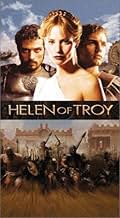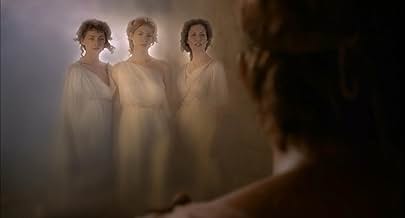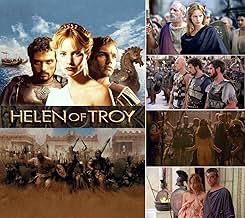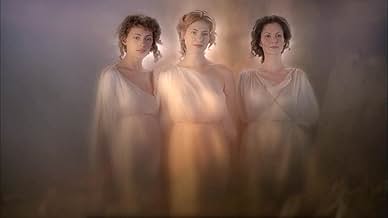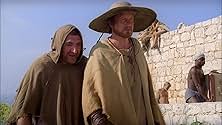VALUTAZIONE IMDb
6,2/10
6938
LA TUA VALUTAZIONE
Aggiungi una trama nella tua linguaThe abduction of beautiful Helen, wife of Spartan King Menelaus, by Paris of Troy triggers a long war.The abduction of beautiful Helen, wife of Spartan King Menelaus, by Paris of Troy triggers a long war.The abduction of beautiful Helen, wife of Spartan King Menelaus, by Paris of Troy triggers a long war.
- Candidato a 1 Primetime Emmy
- 1 vittoria e 7 candidature totali
Sfoglia gli episodi
Recensioni in evidenza
The Helen of Troy miniseries on USA today failed apparently because the writer lacked the nerve to tell the classic story, and instead made up his own. Instead of using Homer's Illiad as a starting point, the TVsters seemed to turn to the 1956 film as the primary source--turning the seduction/kidnap of Helen into a big ol' love story.
So many key elements were missing: the interventions of the gods, the quarrel between Achilles and Agamemnon, the killing of Patroclus in Achilles armor, Achilles subsequent killing of Hector, etc. This was the storyline of what we know of the myth of the Trojan War.
And major characters are triviliazed or disappeared: Hector's glory on TV is as a second banana to Paris; mighty Ajax gets a mention, little more; Diomedes, Nestor, Idonmoneus are absent. On the Trojan side, Aeneas, Sarpedon, Glaucus, Deiphobus and others are equally invisible.
Agamemnon is seen, not as a hero with the fatal flaw of hubris but a Hitlerian monster. Menaleas, a strong warrior in the Illiad, seems like he attended all the sensitivity training classes avaiable to the Achians, (the Greeks were referred to as "the Ageans" in the series), but wasn't much of a fighter.
But my biggest beef is with the character of Paris (Helen seemed commonplace, but acceptable). Paris was not much of a hero in the Illiad; actually, he was a bit of a feckless bounder. Helen's feelings toward him were decidedly mixed, with lust, pity, and contempt thrown together. Hector upbraided Paris on several occasions for his cowardice and sloth, but then, Paris occasionally entered the fray as an experienced soldier as well.
I sense the writers chickened out of grappling with a different kind of plot, and thereby missed an opportunity. The difficult interplay among the Greek heroes, the complicated moral choices on both sides, the tragic savagery of war, while existing to small degrees in the series, took back seat to a more or less conventional love story.
Too bad. Production values were fair, and some of the elements were there to make something better.
So many key elements were missing: the interventions of the gods, the quarrel between Achilles and Agamemnon, the killing of Patroclus in Achilles armor, Achilles subsequent killing of Hector, etc. This was the storyline of what we know of the myth of the Trojan War.
And major characters are triviliazed or disappeared: Hector's glory on TV is as a second banana to Paris; mighty Ajax gets a mention, little more; Diomedes, Nestor, Idonmoneus are absent. On the Trojan side, Aeneas, Sarpedon, Glaucus, Deiphobus and others are equally invisible.
Agamemnon is seen, not as a hero with the fatal flaw of hubris but a Hitlerian monster. Menaleas, a strong warrior in the Illiad, seems like he attended all the sensitivity training classes avaiable to the Achians, (the Greeks were referred to as "the Ageans" in the series), but wasn't much of a fighter.
But my biggest beef is with the character of Paris (Helen seemed commonplace, but acceptable). Paris was not much of a hero in the Illiad; actually, he was a bit of a feckless bounder. Helen's feelings toward him were decidedly mixed, with lust, pity, and contempt thrown together. Hector upbraided Paris on several occasions for his cowardice and sloth, but then, Paris occasionally entered the fray as an experienced soldier as well.
I sense the writers chickened out of grappling with a different kind of plot, and thereby missed an opportunity. The difficult interplay among the Greek heroes, the complicated moral choices on both sides, the tragic savagery of war, while existing to small degrees in the series, took back seat to a more or less conventional love story.
Too bad. Production values were fair, and some of the elements were there to make something better.
As a big fan of mythology and the Iliad, I'm pretty surprised by how nitpicky people are being on the details. Having taken a "Mythology in Film" course, I can safely state the following:
1) It's not supposed to be "The Iliad," it's "Helen of Troy." 2) It's a film. Made 3,000 years later. Targeted at an entirely different audience. 3) Greek mythology tends to be greatly inconsistent anyway, depending on your source. 4) Patroklus is never mentioned to justify Achilles's rage against Hector. So what? If Achilles hadn't withdrawn from war, he would've killed Hector anyways. And having him withdrawing and re-entering into the war would only have distracted from the main story (Helen) without really adding anything.
There's a difference between myths and literature. One can stray from the literature of a story while staying true to the mythology of it. The Iliad itself was constantly being reinvented by generations of oral poets who changed the story every time they performed it. Back in ancient times, a person who merely recited the story verbatim would be considered an inferior, because he'd merely be a copycat rather than a storyteller.
When it comes to the spirit and tradition, "Helen" shines. For instance, in the Iliad, Achilles compares Agamemnon taking Brisius to Paris taking Helen. In the film, the comparison is made literal. Brilliant. Then you have themes and scenes taken from the Orestia. Three or four different ideas are brought together in the span of one.
"Helen" may be a bit loose with the details, but it shows a good understanding why those details took place, and stays true to capturing their motivations. Just because they don't follow the material exactly doesn't mean they don't know it really, really well. The same is true for a lot of other film productions, from "Desire Under the Elms" to "O Brother Where Art Thou" to "Medea" and even "Clash of the Titans."
All and all, a good flick, I was pleasantly surprised. My only real complaints was the casting of Achilles (I assume they were combining his character with Ajax/Diomedes) and the fact that Hector never gets to actually beat anyone in combat (That was disappointing, to say the least).
1) It's not supposed to be "The Iliad," it's "Helen of Troy." 2) It's a film. Made 3,000 years later. Targeted at an entirely different audience. 3) Greek mythology tends to be greatly inconsistent anyway, depending on your source. 4) Patroklus is never mentioned to justify Achilles's rage against Hector. So what? If Achilles hadn't withdrawn from war, he would've killed Hector anyways. And having him withdrawing and re-entering into the war would only have distracted from the main story (Helen) without really adding anything.
There's a difference between myths and literature. One can stray from the literature of a story while staying true to the mythology of it. The Iliad itself was constantly being reinvented by generations of oral poets who changed the story every time they performed it. Back in ancient times, a person who merely recited the story verbatim would be considered an inferior, because he'd merely be a copycat rather than a storyteller.
When it comes to the spirit and tradition, "Helen" shines. For instance, in the Iliad, Achilles compares Agamemnon taking Brisius to Paris taking Helen. In the film, the comparison is made literal. Brilliant. Then you have themes and scenes taken from the Orestia. Three or four different ideas are brought together in the span of one.
"Helen" may be a bit loose with the details, but it shows a good understanding why those details took place, and stays true to capturing their motivations. Just because they don't follow the material exactly doesn't mean they don't know it really, really well. The same is true for a lot of other film productions, from "Desire Under the Elms" to "O Brother Where Art Thou" to "Medea" and even "Clash of the Titans."
All and all, a good flick, I was pleasantly surprised. My only real complaints was the casting of Achilles (I assume they were combining his character with Ajax/Diomedes) and the fact that Hector never gets to actually beat anyone in combat (That was disappointing, to say the least).
I can't believe that the writers of this miniseries read any of the myths or the Iliad itself. The inconsistencies were truly amazing. But I guess it didn't matter, as the plot seemed to revolve around fighting and nudity. First of all Cassandra could not have told her father to kill the infant Paris; she did not receive her powers until she was a young woman. Apollo wanted her; she said yes and received the gift of prophecy; then, when she refused him, he could not take it back but cursed her that no one would believe her. Helen was not kidnapped by Theseus! Clytemnestra had three children, and Orestes and Elektra helped her wreak her vengeance for the death of Iphigenia. The gods & goddesses took a much more active part in the war, with Aphrodite telling Paris where to shoot Achilles and Athena guiding Odysseus, her favorite. The arrow in the heel meant nothing without the explanation. Agamemnon took Cassandra as part of his spoils. Hector had a wife, Andromache, whom he adored. Where was she? Where was Ajax?This was just too far from canon. One thing I did like was the loving relationship between Clytemnestra and her daughter Iphigenia; it was very understandable why she would kill Agamemnon.
As for the actors, Helen was not that beautiful. It was good to see John Rhys-Davies, but he was too thin and did not look well. Maryam D'Abo was made to look too old--an older actress should have been cast. She's still a Bond girl to me! Achilles was overplayed, and there was no reason for him to be bald. I did like Odysseus, however.
I'm not really sorry I watched it, just a little ashamed of myself for sticking out the whole four hours.
As for the actors, Helen was not that beautiful. It was good to see John Rhys-Davies, but he was too thin and did not look well. Maryam D'Abo was made to look too old--an older actress should have been cast. She's still a Bond girl to me! Achilles was overplayed, and there was no reason for him to be bald. I did like Odysseus, however.
I'm not really sorry I watched it, just a little ashamed of myself for sticking out the whole four hours.
Unlike the epic TROY, which spent much time and money recreating the spectacle of the Trojan War with CGI, the emphasis here is on the political ambitions and prophecies leading up to the start of the siege of Troy. Rufus Sewell as Agamemnon gives a performance (as the man who would conquer Troy) which eerily evokes Oliver Reed at his sinister best, as he makes it clear that the romance of Helen and Paris was merely a convenient excuse for the events that followed, and that the war came out of his own thirst for conquest. Sienna Guillory is attractive as Helen, but her role is rapidly reduced to that of a bystander in the great events that swirled around her. And the film makes clear its logic about this: how could a woman be responsible for a war in a time when even princesses were chattels of the royal houses to be auctioned off in marriage for political gain? As it deals more intimately with its characters and looks more closely at social power structures and gender roles of the period, this film is much more interesting as a human drama than the rather empty spectacle TROY.
DVD borrowed from my local public library, DTS sound, widescreen, each half on each of two disks, I watched it on consecutive nights. I was most drawn to it for Sienna Guillory, young British actress and daughter of a famous musician from Cuba, whom I had seen in the modern remake of 'The Time Machine.' She plays Helen of Sparta, who becomes Helen of Troy, and is the default object of passion which sparks the war and eventual fall of Troy, via the Trojan Horse. Agamemnon and Achilles are depicted as heartless killers with no redeeming qualities. I don't know what Homer had in mind, but this seems to be decidedly different from most earlier treatments of these mythical characters. The video transfer to DVD is very high quality, but the sharpness and realistic colors are not as effective as some period pieces (e.g. Gladiator) which use a mildly tinted image and selective focus to better depict the olden times. Still, for the type of movie it is, a worthwhile depiction of some important Greek mythology.
Lo sapevi?
- QuizThis adaptation changes several aspects of the original legend of Helen. The gods play almost no role in the characters' lives, Helen is not shown to have any children and it's not explained how Cassandra supposedly got her powers. Instead, the series plays the story like a brutal historical event with little supernatural elements.
- BlooperIt is mentioned three times that Troy is the gateway to the riches of Byzantium. The city of Byzantium was founded in 667BC five centuries after the Trojan War.
- ConnessioniReferenced in In Praise of Action (2018)
I più visti
Accedi per valutare e creare un elenco di titoli salvati per ottenere consigli personalizzati
- How many seasons does Helen of Troy have?Powered by Alexa
Dettagli
- Tempo di esecuzione
- 1h 28min(88 min)
- Colore
- Mix di suoni
- Proporzioni
- 1.78 : 1
Contribuisci a questa pagina
Suggerisci una modifica o aggiungi i contenuti mancanti


